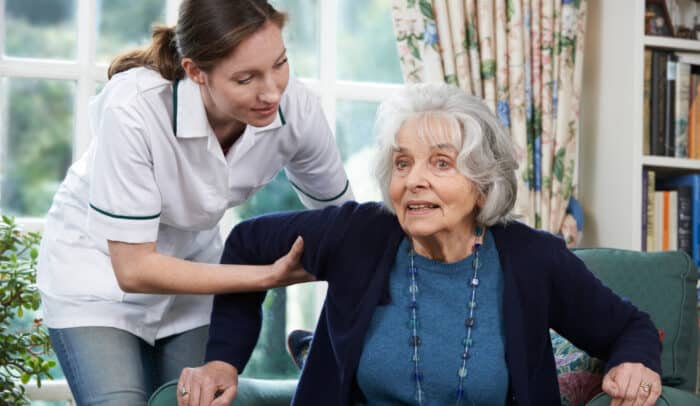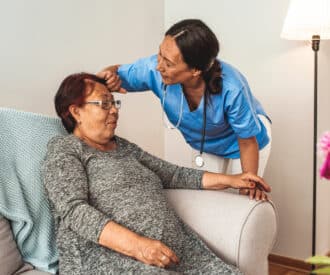
Understanding and making decisions about care options for your older adult can be an overwhelming task. All Home Care Matters shares 6 common signs that your older adult needs more care and explains the 3 main types of senior care options.
Determining when it's time to seek out care options, whether that means in-home care, assisted living, or another form of senior care, can be an overwhelming task.
The internal struggle between emotion and logic is common for many family members as they grapple with the idea of placing their loved one under another person’s care.
But when it comes to the safety and well-being of our older family members, it's important to be proactive and make informed decisions.
Whether you have already begun the search for senior care or are simply preparing for the future, this article can help you recognize when the time has come.
Below, we’ll explore 6 of the most common signs that your family member is ready for more substantial care and discuss the 3 main senior care options to consider.
6 top signs that an older adult needs additional care
1. Changes in physical health
One of the clearest signs that it’s likely time to find care is witnessing changes in their physical health.
This could include difficulties with mobility, chronic pain, or new diagnoses of medical conditions.
If you notice they are having trouble getting around their home, using the bathroom, or performing other activities of daily living, it may be time to consider getting help from professionals.
This can help ensure that they have the support and assistance they need to stay safe and comfortable.
2. Changes in mental health
In addition to physical health changes, changes in cognitive ability or mental health are also signs that it's time for more regular care.
You may witness symptoms of depression or anxiety, confusion, forgetfulness, or general cognitive decline.
If you observe that your loved one is having trouble remembering things or getting confused easily, it may be wise to begin researching memory care or another type of senior care that specializes in providing support for individuals with dementia or Alzheimer's disease.
3. Increased isolation
As people age, they often become more isolated. In fact, around 43% of adults aged 65 or over report feeling lonely on a regular basis.
We know that social isolation can have serious negative impacts on mental and physical health, not to mention the emotional impact.
If you notice that your loved one is spending more time alone than normal, is making comments regarding their loneliness, or even begins to withdraw, it may be time to consider a care option that can provide this vital socialization and companionship.
4. Safety concerns
Any concerns regarding safety is another significant factor to consider.
Experiencing frequent falls, leaving the stove on, or forgetting to take important medications are all red flags that can become dangerous without intervention.
Exploring care options that can provide the necessary support and assistance will help protect them from accidental harm.
5. Caregiver burnout
Another personal factor to consider is caregiver burnout.
Caregivers often experience stress, anxiety, and exhaustion as they try to juggle their own responsibilities with the demands of caregiving.
If you're a caregiver for a family member and are experiencing burnout, it's crucial to recognize that you alone may no longer be able to provide the level of care that your loved one now needs.
6. Financial considerations
Finally, you’ll need to consider the financial implications of senior care.
In-home care, assisted living, and most other forms of care can be costly, and it's important to carefully evaluate your financial situation before making a decision.
However, it's also important to consider the long-term costs of not seeking out care.
For example, if they experience a fall or other medical emergency due to a lack of needed support, the costs of hospitalization and rehabilitation can be immense.
3 types of care to consider
When it comes to finding senior care, there are 3 main options to consider.
1. In-home Care
This type of care can be a good choice for individuals who want to remain in their own homes but need extra support with daily living.
Often, this includes assistance with bathing, dressing, cooking, and even medication management.
In-home care can also provide companionship, which is beneficial for those experiencing feelings of isolation.
2. Assisted living
Assisted living is another option to consider. These care communities provide a range of services and amenities, including meals, housekeeping, and transportation.
Many also offer social activities and events, allowing residents to stay active and engaged.
Assisted living can be a good choice for individuals who need a higher level of care than can be provided at home, but who still want to maintain some independence.
3. Memory care
This type of care is specifically designed for individuals with dementia or Alzheimer's disease.
Memory care communities provide a secure and supportive environment for individuals with memory loss, with specialized programs and services to meet their unique needs.
Explore options and consider advice from experts
Ultimately, the decision to find care for your older adult is a personal one that will depend on their individual needs as well as on your own resources and capabilities.
If possible, involve your loved one in the decision-making process and explore all of your options before making a final decision.
If you're not sure where to start, consider reaching out to a professional care advisor or senior care consultant.
They can provide guidance and support as you navigate the multi-faceted world of care, helping you to make the right decision that will best meet your older adult’s needs.
Recommended for you:
- 3 Tips to Choose Between Assisted Living vs In-Home Care
- 7 Senior Housing Options: Which One Works Best?
- When They Say No: 8 Ways to Introduce In-Home Care for Seniors
Guest contributor: Lance A. Slatton is a senior case manager at Enriched Life Home Care Services in Livonia, MI. He is also host of the podcast All Home Care Matters, a must-listen podcast and YouTube channel whether you’re a caregiver looking to enhance your knowledge and skills or simply seeking to learn more about dementia home care. By subscribing to the show, you will gain access to a wealth of information and tips that can help you provide the best possible care for your loved one. Find us on Apple podcasts or on YouTube.
References:
– Actualizing Better Health And Health Care For Older Adults, HealthAffairs
– Share of old age population (65 years and older) in the total U.S. population from 1950 to 2050, Statista
This article wasn’t sponsored and doesn’t contain affiliate links. For more information, see How We Make Money.
[optin-monster slug=”yxbytm35zhsdfopnw7qk”][optin-monster slug=”jvhyplxmb4umsjazxecn”]




